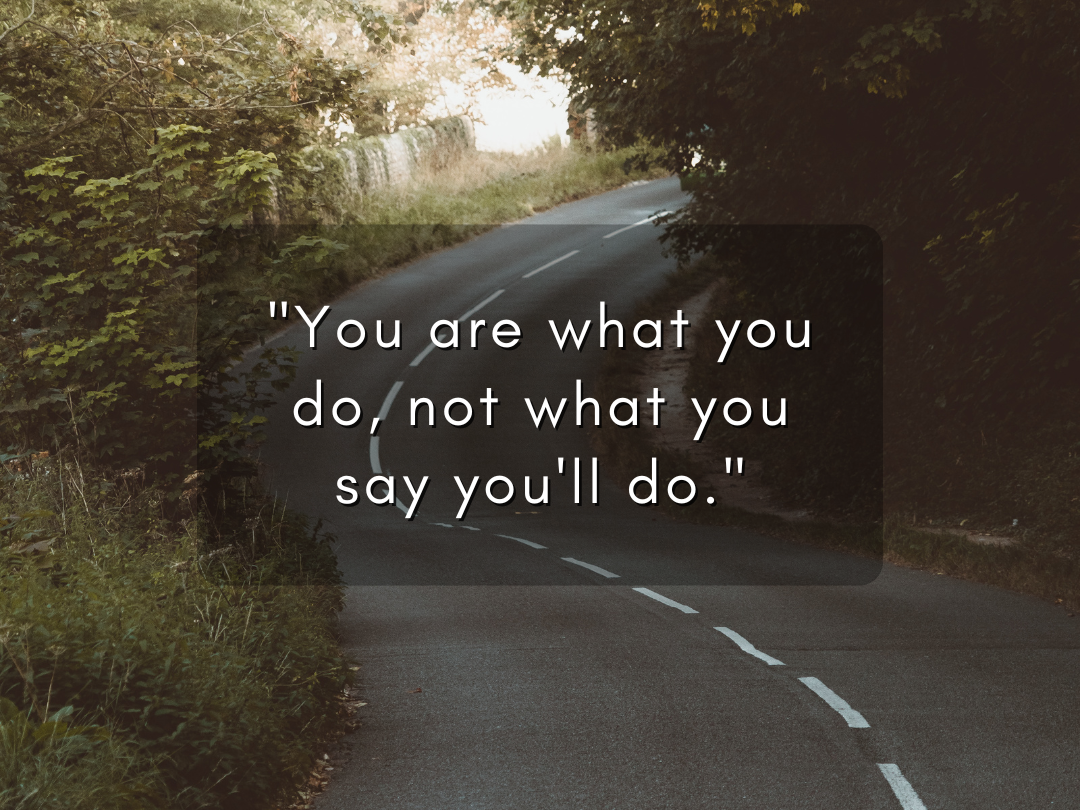“You are what you do, not what you say you’ll do.”
- Rick J Petronella PhD
- May, 15, 2024
- Newsletter
- No Comments
Dr. Rick Petronella

May 2024 Newsletter
“You are what you do, not what you say you’ll do.”

Carl Jung, a psychiatrist and psychoanalyst who studied under Sigmund Freud, said, “You are what you do, not what you say you’ll do.”
Have you ever caught yourself saying things like “I’ll do this someday” or “I hope X will happen”? We all do it from time to time, but here’s the empowering truth: mediocrity exists when we prioritize empty words over actions. By taking charge of our actions, we can steer clear of the trap of mediocrity. I do not know of anyone who felt they had done everything they needed to do. All of us tend to either overload our schedules or put things off because of not being able to get to everything we thought we could do.
Consider this: How many times have you convinced yourself that you’ll tackle something later when life isn’t so hectic? The reality is that tomorrow is never a guarantee, and the only time that truly matters is today. It might sound a bit harsh, but it’s a truth we must embrace. Time is a precious resource that should never be squandered.
There’s a powerful quote that resonates with this idea: ‘Yesterday you said tomorrow.’ It encapsulates the notion that our actions, not our intentions or idle promises, truly define us. Words can be misleading, but actions have a voice that echoes far louder than any speech.
“We can get very passionate about something we really want. In the beginning, this passion is so powerful that we go all out to do our best to obtain it.
For example, let’s say you want to lose 20 pounds. In the beginning, you lose five pounds right away. But then you gain three pounds back after a long, lazy weekend and your passion dwindles. This is where resilience and determination come in. You start feeling frustrated and feel like you haven’t gotten anywhere with your goal. It feels like it is going to take too long and be too hard. You may even feel like you’ve actually failed. But remember, setbacks are just part of the journey.
The next time you think about losing weight, don’t give up. Keep pushing forward with the same effort and soon, you’ll see progress again.

So why does this happen?
1) Lack of motivation
Again, this year, I procrastinated on my tax return. It’s an administrative task, and I don’t like it. But it helps when I think about it this way: “I’m due a refund this year.” Concentrating on the amount of money I get back versus the time it takes to do my taxes is an excellent hourly rate. And it motivates me to focus on getting it done.
The basic principle is reframing. If you know the job has to be done, but it’s not emotionally important to you, find a way to make it important. (If I was paying a penalty fee for turning my taxes in late, I could set aside the equivalent penalty amount for a reward, for example.)
What will you get by doing this that’s important enough to motivate you to do it now?
2. Lack of focus and fatigue
Distractions are everywhere. You must learn to ignore them.
Minimize distractions by secluding yourself. Disconnect the Internet and power off your cell phone if you have to. Check e-mail and voicemail at set intervals instead of randomly every few minutes. Find a quiet space where you can concentrate on the task at hand. And only take breaks as a reward for accomplishing smaller sub-tasks.
Also, it’s hard to focus when you’re fatigued, so get enough sleep, eat healthy, and exercise regularly.
3. Not knowing where or how to start
There are times when you can’t figure out how to begin something. Or maybe the task looms in front of you. Where do you begin? You can’t figure it out, so you set the task aside.
Don’t give up. Uncover the starting and ending points and start filling in the blanks one at a time.
4. Perfectionism
One of the best bits of advice ever about perfectionism comes from Melody Beattie’s book Codependent No More. “It just doesn’t matter,” she says. “IT JUST DOESN’T MATTER!”
But that’s hard advice to put into practice sometimes. I’ve often put off implementing ideas by saying I’m not yet prepared to do a great job.. Part of me thinks I’ll end up wasting the idea by implementing it poorly at my current skill level.
But guess what? My current level of skill isn’t going to increase unless I practice. And I can’t practice until I implement it. That means I have to implement my current skill level, make mistakes, learn from them, and press on.
So, in reality, not implementing that idea right now is the only true way to waste it.
It’s time to break free from the cycle of passion and procrastination. Embrace a mindset of urgency and productivity. Take a look at your to-do list and ask yourself what truly deserves your attention. Delete the unnecessary and focus on what truly matters. Make a conscious effort to take action, and watch as your productivity and fulfillment soar.
So, remember, it’s not about what you say you’ll do, but what you actually do that defines you.

QUIZ: How Well Do You Take Responsibility For Yourself?

Years ago comedian Flip Wilson created a character named Geraldine, who excused her outrageous behavior by claiming “the devil made me do it.” Poor Geraldine, helpless and ineffective because she wouldn’t take responsibility for herself. In his book, Grow Up! How Taking Responsibility Can Make You A Happy Adult, Dr. Frank Pittman wrote, “Finding the responsible thing to do is the lifelong quest for grown-ups.”
Take the following quiz to find out how well you take responsibility for yourself. You won’t be scored at the end, but answer true or false to the following questions, and elaborate a bit on those that feel especially relevant.
T / F 1. I believe that my actions are the primary force in how I live my life and that I am solely responsible for my actions.
T / F 2. I am responsible for my reactions when other people, events, or circumstances affect my life.
T / F 3. I take responsibility for my body and for my physical well-being. I eat healthfully, exercise regularly, and maintain good hygiene.
T / F 4. I may not always be able to select co-workers or team members, but I am responsible for the companions I choose and the company I keep.
T / F 5. What I say and how I say it is my responsibility. So is listening well.
T / F 6. I am responsible for my own emotions. Someone else doesn’t “make” me feel a certain way.
T / F 7. My behavior with others is up to me—I’m responsible for whether I “go along” with the crowd or remain passive in the face of actions or behaviors I don’t agree with.
T / F 8. My personal happiness is my own responsibility. It’s no one else’s job to make me happy or give me what I need or want to be happy.
T / F 9. Everything in life is a choice, and I take responsibility for mine—both the good and the not-so-good. I also take responsibility for how I handle the results of my choices.
T / F 10. I accept responsibility for doing the right thing even though it may not always be the easiest path.
T / F 11. I am responsible for choosing the values by which I live.
T / F 12. How I spend my time is up to me. Even though I may be required to work a certain number of hours or to be present at a specified time and place, the quality of my time is my responsibility.
T / F 13. I am responsible for how I use the earth’s resources and realize that my decisions have implications that reach beyond the personal to the global.
T / F 14. I don’t wait for someone else to make my life interesting. It’s my responsibility to engage my curiosity, explore my interests, and follow my passions.
T / F 15. The manner in which I maintain my spiritual well-being is my responsibility.
T / F 16. Self-responsibility includes seeking solutions when I have problems and asking for help when I need it.
Although self-responsibility may not always be easy, the results are empowering and life-affirming. If you have any questions or if you’d like to talk about your responses to this quiz, don’t hesitate to call 678-395-7922 or front.office@compasschoices.com